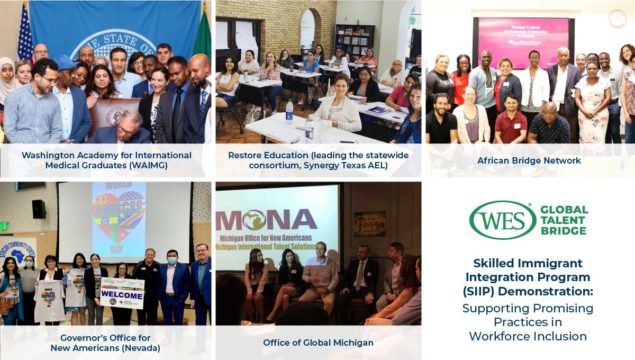Ensuring that immigrants and refugees reach their professional and educational goals in the United States is crucial to the vitality of local communities and the overall economy, especially during the current critical period of economic recovery. A robust national immigrant and refugee integration strategy will pave the way for professional advancement opportunities for immigrants and refugees, enabling them to use their valuable skills and education to their full potential.
Nearly 50 percent of recent immigrants have a bachelor’s degree or higher. Yet, about two million internationally educated immigrants are either unemployed or underemployed, resulting in a loss of $39.4 billion in foregone earnings each year and more than $10 billion in unrealized federal, state, and local taxes.
The U.S. health sector in particular is significantly impacted by the underutilization of the skills and talents of immigrants and refugees. According to the Migration Policy Institute, 263,000 immigrants and refugees with degrees in health care are underemployed or unemployed in the U.S. Of these immigrants, 165,000 were trained outside the U.S.
Immigrant physicians, researchers, nurses, health aides, and hospital workers, with their international training and linguistic and cultural assets, are uniquely poised to revitalize the U.S. health care system, but significant barriers to relicensure often stand in their way. Meanwhile, communities across the U.S. are suffering from a shortage of health care workers—a shortage that exacerbated the strain on resources and operations caused by the COVID-19 pandemic and that will continue to impact our health care system in the future.
With an effective national immigrant and refugee integration strategy, U.S. businesses struggling to fill gaps in their labor force can acquire the talent necessary to compete and grow; immigrants and their families will experience improved economic opportunities; and the U.S. economy will benefit from increased consumer spending, fiscal contributions, and improved services.
Five Steps the Federal Government Should Take to Ensure Professional Opportunities for Immigrants and Refugees with International Credentials
1.Increase funding for workforce development training and adult education programs that are tailored to meet the needs of internationally trained immigrants and refugees.
The federal government should increase federal funding for workforce development and adult education to support programs equipped to serve immigrant and refugee professionals and address gaps in services for adult English language learners with international credentials.
2. Support state and local communities in advancing the work of immigrant professional integration.
Over the past decade, states and local communities have taken the lead in promoting programs and policies that support the economic integration of immigrant professionals, often with the oversight of statewide or local Offices for New Americans (ONAs) and welcoming initiatives. The federal government should support these efforts by establishing a national ONA tasked with developing a framework for immigrant and refugee integration. In addition, the Administration can work with relevant federal agencies, including the U.S. Department of Labor (DOL), the Department of Commerce (DOC), the Department of Health and Human Services (HHS), and the Department of Education (ED), to expand technical assistance, grant funding, and other support to strengthen the capacity of state and local governments and community agencies that assist immigrants and refugees as they seek employment commensurate with their skills and experience.
3. Reduce barriers to occupational licensure by supporting state review and updating of licensing processes to ensure immigrants and refugees are not disproportionately impacted.
In recent years, researchers and policymakers have focused on the potential of licensing reform to reduce barriers to in-demand licensed occupations and increase economic mobility across states. Recognizing the essential skills and experience that internationally trained health professionals offer, governors in six states exercised their emergency authority to provide temporary licenses to health care professionals licensed outside the U.S., allowing them to treat COVID-19 patients. The federal government should work with states to identify solutions to create permanent pathways to licensure for these talented professionals.
4. Expand access to apprenticeship programs.
Apprenticeship programs are gaining attention as an effective means of training individuals at varying skill levels in a wide range of occupations and industry sectors. In 2019, the DOL announced $100 million in grant funding to strengthen industry-recognized apprenticeship initiatives and expand access to these opportunities to all Americans. The DOL should ensure equal access to immigrants and refugees for federally funded apprenticeship programs.
5. Increase support for refugees.
The refugee resettlement sector in the U.S. is highly focused on rapid attachment to the workforce, which often means putting refugees with international credentials in jobs that do not meet their skillsets. The Refugee Career Pathways program was established by the Office of Refugee Resettlement in 2018 to address such obstacles faced by resettled refugees in relaunching their careers in the U.S. The federal government should augment support for this program and offer comprehensive pre-arrival information on career pathways and occupational relicensure as well as access to English language learning opportunities while refugees await resettlement In addition, federal funding is needed to support training for ORR-funded case managers and job developers who assist refugees with international education and experience. Lastly, the time frame for refugee assistance should be extended.
The federal government must take the steps necessary for immigrant and refugee integration and inclusion, to ensure opportunities for immigrants and refugees to contribute their professional skills and training. The economic health of the U.S. is dependent on the strength of its workforce, and immigrants and refugees can play a powerful role in supporting our nation’s recovery and ensuring its economic stability.



